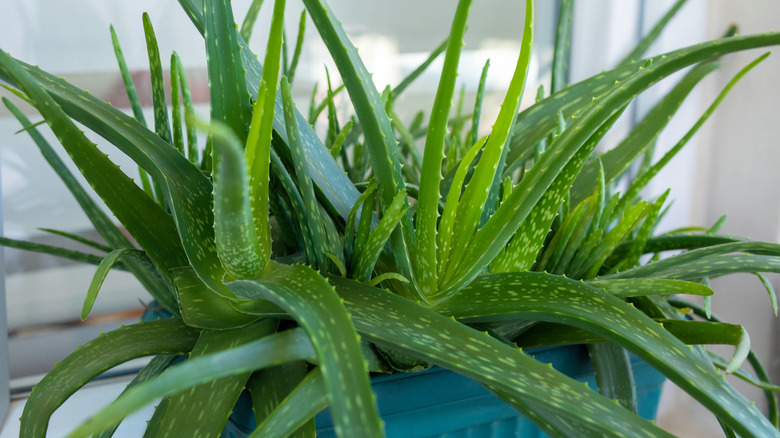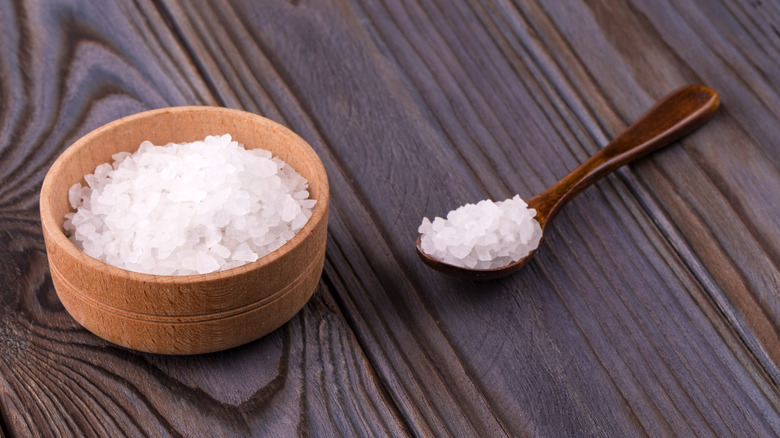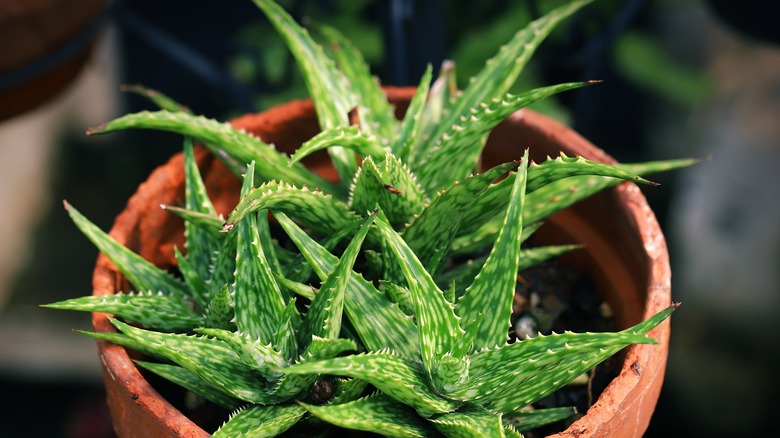The Secret Ingredient You Need For A Thriving Aloe Vera Plant
Aloe vera plants are fantastic and low-maintenance houseplants, thriving when their basic needs are met. These hardy plants require minimal attention, with fertilization being one aspect to consider. While they don't demand frequent feeding, occasional use of a balanced, diluted fertilizer can enhance their growth. In addition, aloe vera plants prefer well-draining soil, plenty of sunlight, and infrequent watering, as it belongs to the succulent family and stores water well. Their resilience makes them wonderful houseplants, adding aesthetic charm and potential practical benefits with their soothing gel. By being mindful of these simple care requirements, anyone can enjoy the beauty and benefits of healthy aloe vera plants in their home without much fuss. Nevertheless, you can easily give this plant a nutrient-packed boost by adding a secret ingredient – Epsom salt – into its watering routine.
Epsom salt has many uses around the house and can be a beneficial fertilizer for indoor plants like aloe vera due to its rich magnesium and sulfur content. Magnesium is a crucial component in chlorophyll production, aiding in photosynthesis and enhancing the plant's ability to generate energy. Moreover, sulfur contributes to overall plant health, promoting enzyme activation and nutrient absorption. By using Epsom salt in moderation, indoor plant enthusiasts can support their aloe vera's growth, ensuring vibrant foliage. It's a simple yet effective way to provide essential nutrients, promoting the overall well-being of indoor plants like aloe vera in a controlled and convenient manner. So next time you're at the drugstore, pick up a bag of Epsom salt for your houseplants.
How to apply epsom salt to your aloe vera
If you're eager to try a new fertilizer in your gardening adventures, considering Epsom salt as a natural fertilizer for your indoor plants is a good place to start. To fertilize an aloe vera plant using Epsom salt, mix two tablespoons of Epsom salt in one gallon of water. Ensure that the salt dissolves completely. Water the aloe vera plant with this Epsom salt mixture during its regular watering schedule. The magnesium and sulfur in Epsom salt can enhance nutrient absorption and contribute to the overall health of the aloe vera plant. This fertilization method is particularly useful for aloe vera, as it supports its nutrient requirements without overloading it with excessive fertilizers.
In terms of frequency, it's advisable to fertilize with Epsom salt approximately once a month during the growing season, which typically spans from spring to early fall. This is when the aloe vera plant is actively growing and benefiting most from added nutrients. Signs that your aloe vera plant may need fertilization include slow growth, thin or curled leaves, or a generally unhealthy appearance. If the plant exhibits any of these symptoms, it's a good idea to consider Epsom salt fertilization. However, it's crucial not to overdo it — moderation with any types of plant fertilizer is paramount to its successful growth. Adjust the frequency based on the specific needs of your aloe vera, and always monitor the plant's response to ensure you're providing optimal care.
Cautions in using epsom salt
While Epsom salt can be a beneficial fertilizer for aloe vera plants, it's essential to exercise caution to avoid potential issues. One cautionary note is against over-fertilizing. Aloe vera plants are generally hardy and don't require frequent or heavy fertilization, so it's best to use it only during the start of the growing season to avoid harming the plant in the long run. Signs of over-fertilization include yellowing leaves, leaf burn, or stunted growth. If you notice these symptoms, it's crucial to adjust your fertilization practices.
Excessive use of Epsom salt, particularly as a foliar spray, can cause leaf scorch due to its high magnesium content. While magnesium is essential for plant growth, an overdose can disrupt the balance of nutrients, leading to an accumulation of salts on the leaf surface. This excess salt concentration draws water out of plant cells through osmosis, resulting in dehydration and scorching of leaves. The delicate balance of nutrient levels is crucial for healthy plant development, and overapplication of Epsom salt can disturb this equilibrium, adversely affecting the plant's well-being.
Additionally, it's crucial to consider the specific needs to correctly grow and take care of your aloe vera plant. Not all plants have the same requirements, and factors such as soil type, sunlight, and water availability play a role in their overall health. Regularly monitor your aloe vera or any other houseplants for which you've tried this method for any adverse reactions to the Epsom salt, and adjust your fertilization routine accordingly.


